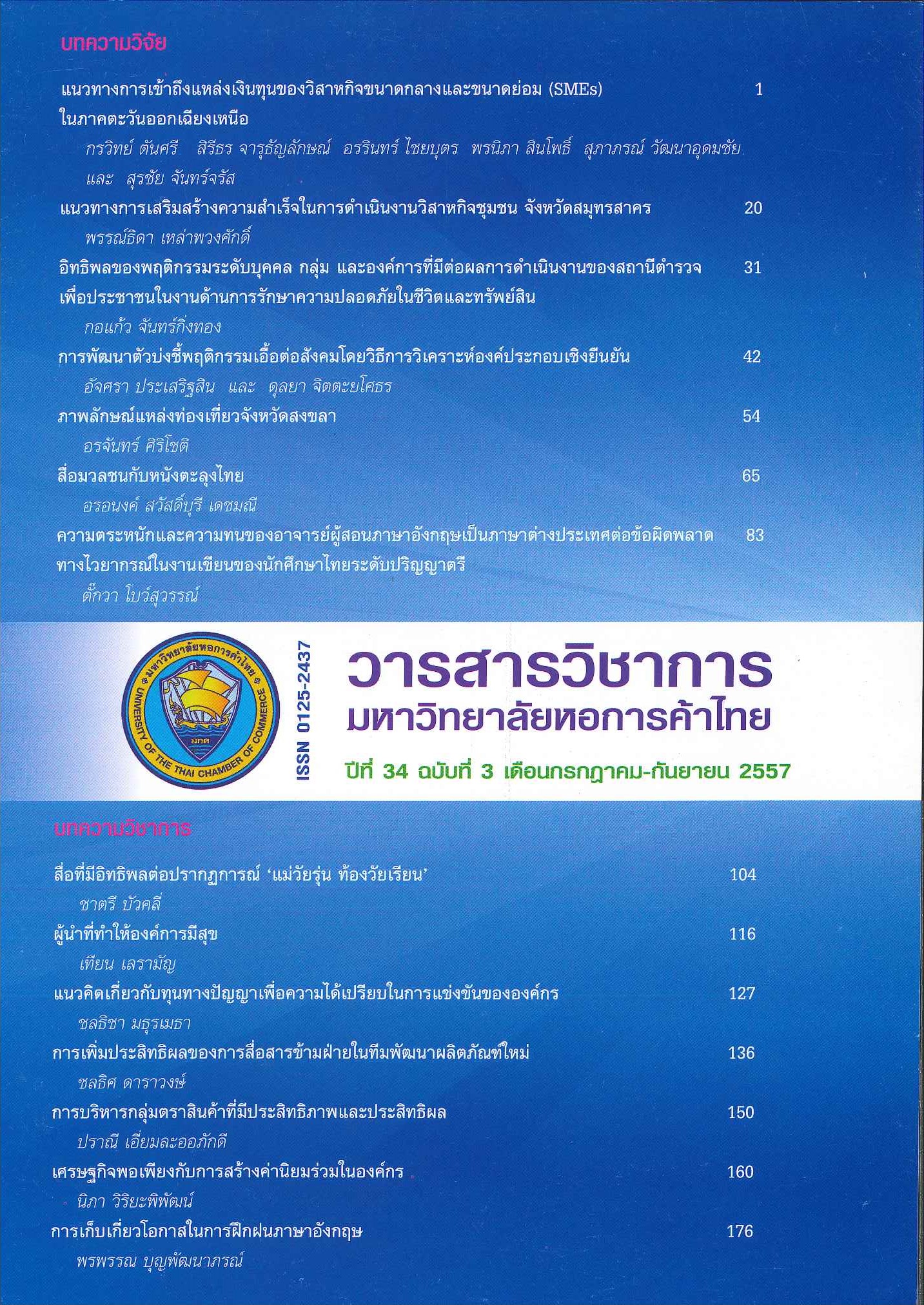Financial Access for Small and Medium Enterprises (SMEs) in the Northeastern Region
Main Article Content
Abstract
The purpose of this research was (1) to study and analyze the characters and major factors required to access commercial banks’ credit for the Small and Medium Enterprises (SMEs) in the northeastern region in order to guide SMEs who have problems with financial access. (2) to give advice and guidance to SMEs so they have more opportunity to access a bank’s credit. The study was conducted in five provinces in the northeastern region, Nakhonratchasima, Khonkaen, Ubonratchathani, Udonthani and Roiet. Questionnaires were completed by 360 companies and interviews were conducted with executives responsible for credit of 10 branches of three commercial banks. Data were analyzed using factor analysis. The results showed that SMEs which obtain commercial bank’s credit placed importance on seven major factors, which are in line with the interview results: (1) business environment; (2) administration and management; (3) credibility and collateral; (4) accounting and financial transactions; (5) individual factors; (6) social status and; (7) business capital structure. In addition, the results showed that SMEs facing severe problems with financial access are those of new establishments or running businesses less than three years, and micro SMEs set up in the form of small shops. However, being well prepared prior to applying for credit is something that the SME operators should take into account. They should know the credit policies of each bank relating to their businesses, pay attention to business management of both the internal and external environment, understand the goal and the business plan as well as have regular transactions on the bank statement. Moreover, they should keep good financial records of the business, consult with Thai Credit Guarantee Corporation when having collateral problems, be well prepared concerning the commercial document system, the finance and accounting system as well as manage their capital structure appropriately. Doing all these things is to have correct and reliable data of business status and performance, which not only brings about credit approval opportunities but also reduces tight credit conditions and obtains fair interest rates from a commercial bank. This also assists the businesses to access various promotion measures by the government.
Article Details

This work is licensed under a Creative Commons Attribution-NonCommercial-NoDerivatives 4.0 International License.
ลิขสิทธิ์ของบทความ
ผลงานที่ได้รับการตีพิมพ์ถือเป็นลิขสิทธิ์ของมหาวิทยาลัยหอการค้าไทย ห้ามมิให้นำเนื้อหา ทัศนะ หรือข้อคิดเห็นใด ๆ ของผลงานไปทำซ้ำ ดัดแปลง หรือเผยแพร่ ไม่ว่าทั้งหมดหรือบางส่วนโดยไม่ได้รับอนุญาตเป็นลายลักษณ์อักษรจากมหาวิทยาลัยหอการค้าไทยก่อน
References
Navavongsathian, Ampol. 2010. “Growing of Family Business: The Important Issue for Survival and Sustainability.” Journal of Business Administration 32,124 : 39-55. (in Thai).
อำพล นววงศ์เสถียร. 2552. “การสืบทอดธุรกิจครอบครัว : ประเด็นสำคัญของความท้าทายเพื่อการอยู่รอดและยั่งยืน.” วารสารบริหารธุรกิจ 32,124 : 39-55.
Organization for Economic Co-operation and Development. 2011. Thailand: Key Issues and Policies, OECD Studies on SMEs and Entrepreneurship [Online]. Available : https://browse.oecdbookshop.org/oecd/pdfs/product/8511041e.pdf
Philip, Mathew. 2010. “Factors Affecting Business Success of Small and Medium Enterprises (SMEs).” Asia Pacific Journal of Research In Business Management 1, 2 : 1-15.
Phoochinda, Wiksakha. 2012. “Implementation of the Sufficiency Economy Philosophy of Environmental Management in the Manufacturing Industry.” University of the Thai Chamber of Commerce Journal 32, 3 : 1-16. (in Thai).
วิสาขา ภู่จินดา. 2555. “การนำหลักของปรัชญาเศรษฐกิจพอเพียงมาประยุกต์ใช้ในการจัดการสิ่งแวดล้อมของอุตสาหกรรมโรงงาน.” วารสารวิชาการ มหาวิทยาลัยหอการค้าไทย 32, 3 : 1-16.
Piyawattananon, Krisadee. 2003. “The Capital Structure of SMEs in Thailand.” Master’s thesis, Chulalongkorn University. (in Thai).
กฤษดี ปิยะวัฒนะนนท์. 2546. “โครงสร้างเงินทุนของธุรกิจ SMEs ในประเทศไทย.” วิทยานิพนธ์ ปริญญามหาบัณฑิต จุฬาลงกรณ์มหาวิทยาลัย.
Silbut, Juthathip; Jantharat, Rajitphan; and Chompikul, Jiraporn. 2010. “Factors of Community Leaders Affecting the Strength of Herbal Product Producers.” University of the Thai Chamber of Commerce Journal 30, 4 : 30-43. (in Thai).
จุฑาธิป ศีลบุตร, รจิตพรรณ จันทราช และจิราพร ชมพิกุล. 2553. “ปัจจัยของผู้นำวิสาหกิจผลิตภัณฑ์สมุนไพรชุมชนที่มีผลต่อความเข้มแข็งของวิสาหกิจผลิตภัณฑ์สมุนไพรชุมชน.” วารสารวิชาการ มหาวิทยาลัยหอการค้าไทย 30, 4 : 30-43.
Thai Institute for Banking and Finance Association. 2003. Handbook of Banking and Finance for Thai Bankers. Bangkok: Erawan. (in Thai).
สมาคมสถาบันการศึกษาการธนาคารและการเงินไทย. 2546. คู่มือการเงินการธนาคารสำหรับนักการธนาคารไทย. กรุงเทพมหานคร: เอราวัณการพิมพ์.
Visetsin, Virit. 2012. “Driving Force of NEC to SMEs.” Industry Journal 54: 11-13. (in Thai).
วิฤทธิ์ วิเศษสินธุ์. 2555. “สร้างแรงขับเคลื่อน NEC สู่ SMEs.” อุตสาหกรรมสาร 54: 11-13.


